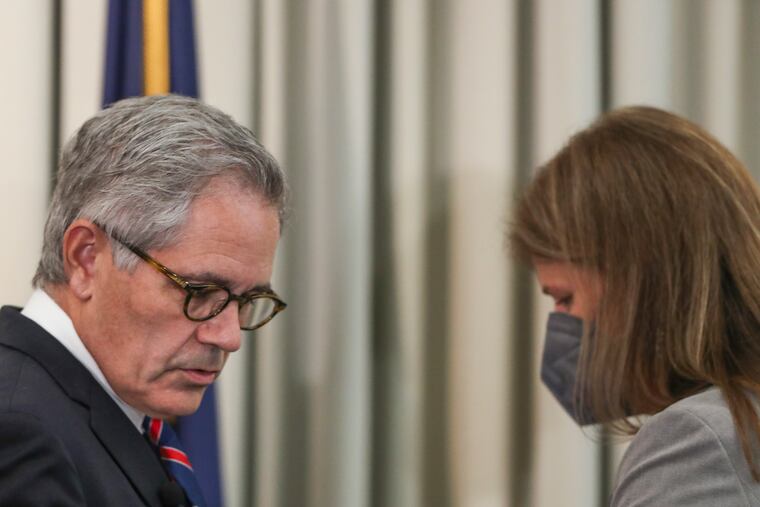A Philly judge is weighing whether to throw out a landmark perjury case against three former homicide detectives
The DA's Office has accused Martin Devlin, Manuel Santiago, and Frank Jasztremsbki of lying at a 2016 retrial. Their attorneys say the prosecution is marred by misconduct.

A Philadelphia judge is weighing whether to throw out a landmark perjury case against three former homicide detectives over allegations that the District Attorney’s Office committed prosecutorial misconduct while investigating the matter several years ago.
Common Pleas Court Judge Lucretia Clemons did not indicate Wednesday how likely she was to agree with that assessment or dismiss the case, and said her review would likely last at least several months. Still, Clemons criticized prosecutors for presenting a grand jury with at least one piece of evidence that she called “wholly inappropriate” — raising questions about how or whether that might impact the case if it’s allowed to proceed toward trial.
The prosecution of Martin Devlin, Manuel Santiago, and Frank Jastrzembski — all now retired — represented an extraordinary development when it was announced two years ago, marking the first time in city history that detectives involved in an overturned murder case had faced criminal charges over their alleged actions in the investigation.
District Attorney Larry Krasner’s office accused the men of lying on the witness stand during a 2016 retrial that threatened to send Anthony Wright back to prison for life.
Krasner’s office said the investigators falsely testified that they had secured a confession or other evidence implicating Wright in the 1991 rape and murder of 77-year-old Louise Talley — assertions they made even though newly discovered DNA evidence undercut their theory of the crime.
The jury in the 2016 retrial — which was handled by Krasner’s predecessors — quickly acquitted Wright, and some panelists took the unusual step of publicly criticizing the evidence presented against him. Wright later agreed to settle a lawsuit against the detectives and the city for nearly $10 million.
After Krasner took office, he convened a grand jury to investigate whether the detectives’ actions in the case represented a crime. They were charged with perjury and false swearing in 2021, just days before the statute of limitations would have barred the case.
Lawyers for the former detectives have defended their actions and said Krasner’s office had committed “egregious” misconduct while investigating them — accusing prosecutors of trampling over the men’s rights, presenting evidence to the grand jury that was “unethical, inadmissible, horrific,” and preventing them from receiving fair consideration before being charged.
“What happened here is unspeakable,” lawyer Brian McMonagle said in court last week. “The prejudice is beyond the pale.”
McMonagle said Patricia Cummings, who ran the grand jury probe and previously supervised Krasner’s Conviction Integrity Unit, had called an expert witness before the panel not only to assert that Wright’s confession was false — but also to accuse Devlin, the detective who elicited it, of coercing false confessions in other, unrelated cases, as well.
Such testimony, McMonagle said, was presented solely to “smear and splatter” the men’s reputations and ensure that the perjury charges related to the Wright case would stick.
McMonagle also said Cummings introduced a host of other improper evidence, including an anonymous juror note submitted in another case Devlin was involved in that described him as “wicked” and “evil.”
“It is historic in terms of how prejudicial that is,” said McMonagle. He said it was akin to prosecutors suggesting that grand jurors should charge a murder suspect in one case simply because the person was also a suspect in others.
Clemons said Wednesday she agreed that the introduction of the juror note was “wholly inappropriate,” adding: “It’s clearly not admissible. It clearly was inflammatory.”
Still, she said she needs more time to review the full case file and determine if that action, or any others, were so egregious that they might outweigh any evidence supporting the charges.
Cummings, who left the DA’s Office in 2022, said Wednesday that she hadn’t seen any of the recent motions filed in the case, and could not comment on the investigation due to grand jury secrecy rules. Prosecutors now handling the case said they did not believe it was marred by misconduct.
Assistant District Attorney Lyandra Retacco said there was clearly sufficient evidence to charge Devlin, Santiago, and Jastrzembski — including Wright’s telling the grand jury that his purported confession was false, and DNA testing that Retacco said effectively proved the detectives’ testimony could not have been true.
Assistant District Attorney Clarke Beljean said that a judge had approved a charging document against the three former detectives, as well as a subsequent indictment. And both were approved after the judge had reviewed all of the evidence presented to the grand jury, he said.
“We have sufficient evidence to move forward,” Retacco said.
Krasner’s office has cast the prosecution as an important measure of accountability in a city that has seen a host of murder convictions overturned in recent years — but no criminal consequences for the police or prosecutors involved in them.
And although the perjury charges in this case relate solely to the 2016 retrial, Krasner’s office has also helped overturn several other convictions the detectives were involved in over the years, mostly from the 1990s. Prosecutors have said those convictions were marred by coerced confessions, fabricated or hidden evidence, or secret deals with key witnesses. Some of the people who were freed have gone on to receive multimillion-dollar payments to settle lawsuits over allegations of police misconduct.
As for the perjury case, Clemons said she did not expect to issue a ruling until at least April. The former detectives remain free on bail in the meantime.